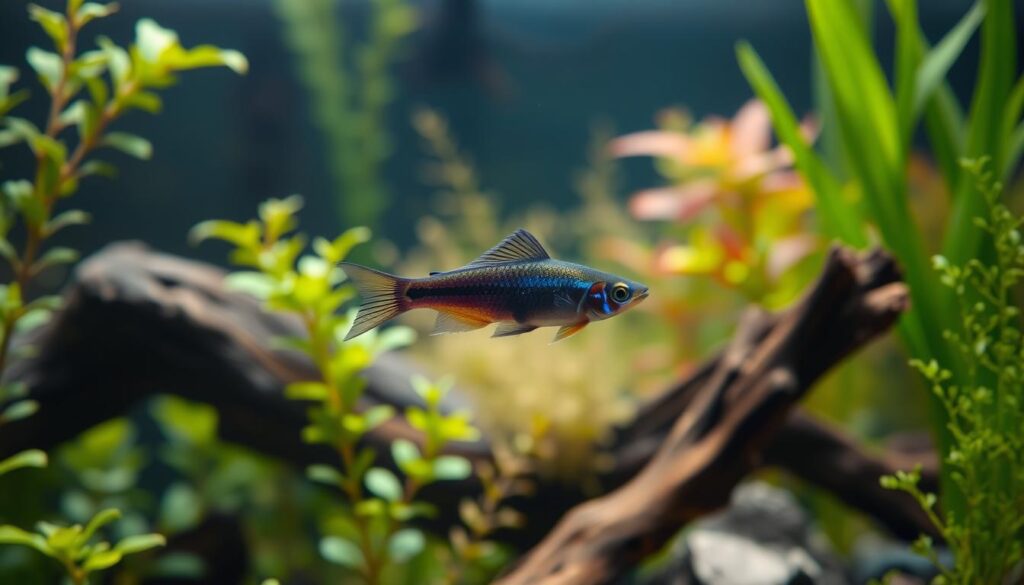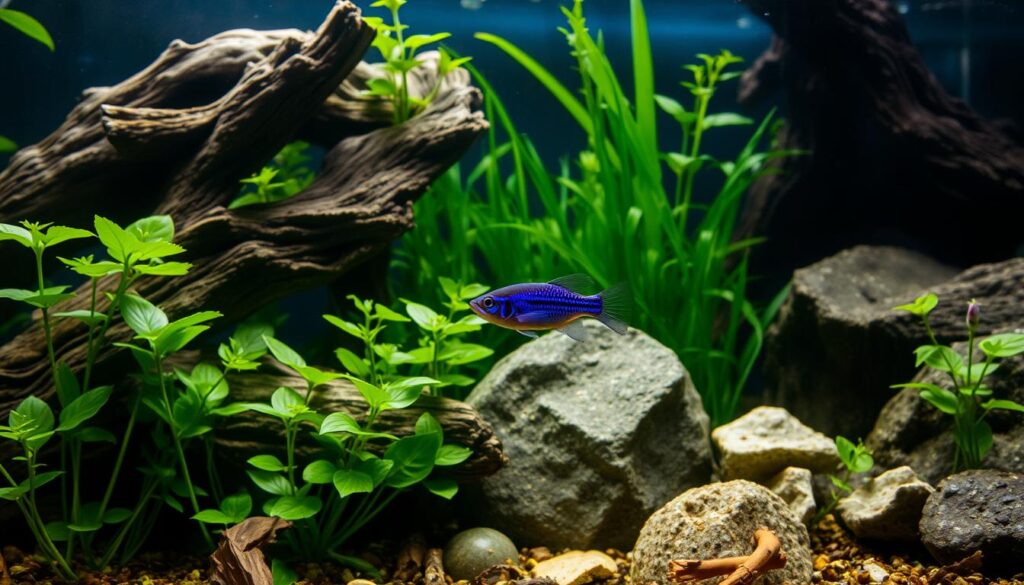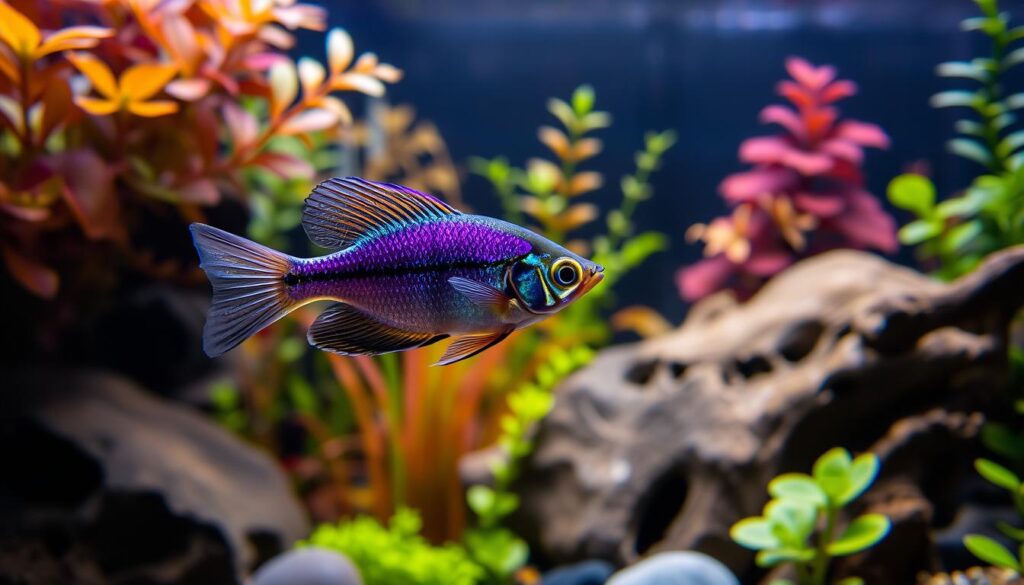Did you know a tiny fish can make your aquarium look amazing? The Purple Emperor Tetra is a small but stunning freshwater fish. It’s only 1.4 inches long but has bright blue-purple colors1.
These fish come from Brazil’s Rio Aripuanã and upper Rio Madeira basins. They’re loved by tropical fish fans1. They’re easy to care for and add a pop of color to any tank.
They belong to the Characidae family and are the only ones in the Inpaichthys genus. You can have them as pets for up to 6 years, enjoying their beauty every day2.
Purple Emperor Tetras like to be in groups, with at least 10 of them together. This makes them look even more beautiful in your tank2. If you’re thinking of getting these fish, you’re in for a treat!
Key Takeaways
- Purple Emperor Tetras are vibrant, blue-purple freshwater fish
- They’re native to specific river basins in Brazil
- These tetras grow up to 1.4 inches and live for about 6 years
- They’re best kept in groups of 10 or more
- Purple Emperor Tetras are ideal for both beginner and experienced aquarists
- They belong to the Characidae family and are the only species in the Inpaichthys genus
Introduction to the Purple Emperor Tetra
I’m excited to share my knowledge about the Purple Emperor Tetra. This fish is a favorite among aquarium lovers for its bright colors and calm nature. It’s a small but beautiful species that adds life to any fish tank.
Origin and Natural Habitat
The Purple Emperor Tetra, also known as Inpaichthys kerri, comes from the forests of Brazil. They live in slow-moving rivers with brown water, often stained by tannins. In their home, they swim in groups at mid-depth in areas with lots of plants3.
Physical Characteristics
These tetras are small, measuring 3 to 4 cm long3. Males have a light purplish-blue body with a thick dark blue stripe. This makes them stand out in any aquarium. Females are less colorful but still have a charming look. Their size makes them great for many tank sizes, from small to large.
Popularity in the Aquarium Trade
The Purple Emperor Tetra is loved in the aquarium world for its bright colors. It adds a pop of color to any tank, fitting well with many decorations. They do best in groups of at least 10 in an 80-liter tank3. Adding plants helps create a beautiful home for them and looks great in the tank.
| Characteristic | Detail |
|---|---|
| Size | 3-4 cm |
| Preferred Water Temperature | 22°C – 26°C |
| Minimum Tank Size | 80 liters |
| Recommended Group Size | 10 or more |
Looking after Purple Emperor Tetras is easy. They eat a mix of dry, fresh, and frozen foods3. With the right care and tank setup, these beautiful fish can brighten your aquarium for many years.
Classification and Scientific Background
The Purple Emperor Tetra is a beautiful fish found in freshwater aquariums. It belongs to the Characidae family and is the only one in the Inpaichthys genus. It was named Inpaichthys kerri in 1977, officially joining the world of fish science.
This fish’s place in the fish family tree is still a bit of a mystery. It’s classified as Incertae sedis, meaning we’re not sure exactly where it fits. As we learn more about fish genetics and evolution, this could change.
In the aquarium world, this fish is known by a few names. You might hear it called the Blue Emperor, Regal Tetra, or Royal Tetra. These names highlight its majestic look and bright colors, making it a favorite in many tanks.
The Purple Emperor Tetra was first brought to the US in 1960 and quickly became popular with fish lovers4. It comes from Colombia, adding a touch of the exotic to home aquariums5.
| Attribute | Details |
|---|---|
| Scientific Name | Inpaichthys kerri |
| Family | Characidae |
| Common Names | Purple Emperor Tetra, Blue Emperor, Regal Tetra, Royal Tetra |
| Taxonomic Status | Incertae sedis |
| Year Described | 1977 |
| Native Origin | Colombia |
| Introduction to US Aquariums | 1960 |
Even though it’s popular in aquariums, the Purple Emperor Tetra is listed as Data Deficient on the IUCN Red List4. This means we need more research to understand its conservation status in the wild.
Purple Emperor Tetra: A Closer Look
I’m excited to explore the world of Purple Emperor Tetras. They are one of the most striking aquatic pets you can have. Their bright colors and unique traits make them stand out.
Size and Lifespan
Purple Emperor Tetras are small fish, reaching up to 1.4 inches (3.5cm) in size6. They can live for about 6 years with the right care. For their well-being, a tank of at least 29 gallons is recommended6.
Color Variations and Patterns
The name Purple Emperor Tetra doesn’t fully capture their vibrant colors. They display purplish-blue hues with iridescent stripes. Their appearance is truly unique among aquatic pets.
Sexual Dimorphism
Purple Emperor Tetras show interesting differences between males and females. Males and females have unique colors and fin shapes:
| Feature | Male | Female |
|---|---|---|
| Body Color | Vibrant purplish-blue | Silvery-blue with beige areas |
| Stripe | Thick iridescent dark blue | Thick black line above |
| Dorsal Fin | Elongated | Regular |
| Adipose Fin | Blue | Reddish orangy-brown |
| Anal Fin | Regular | More angular |
When looking for these fish, you might find great deals. Some stores sell them for as low as $1.00 each6. It’s wise to keep a school of 10 or more to reduce fighting and show their natural behavior6.
Setting Up the Perfect Aquarium
I love making the perfect home for Purple Emperor Tetras in my freshwater aquarium. These fish do well in a tank that looks like their natural home. For a small group, I suggest an aquarium of at least 20 gallons7.
To make it feel like South America, I start with fine river sand on the bottom. Then, I add driftwood branches and twisted roots as decorations. These not only look good but also give the tetras places to hide.

I also put some dried leaves in the tank. They make the water a bit stained, which feels more natural. Even though they don’t live among plants in the wild, a tank with plants can work well for these fish.
Lighting is key. I use dim lights to mimic their natural setting. Or, a tank with lots of plants and good care is also good. Remember, Purple Emperor Tetras like clear, slow water with a pH around or just below neutral8.
| Aquarium Element | Recommendation |
|---|---|
| Tank Size | Minimum 20 gallons |
| Substrate | Fine river sand |
| Decorations | Driftwood, twisted roots, dried leaves |
| Plants | Optional, but beneficial |
| Lighting | Dim to moderate |
By following these tips, I’ve made a great aquarium for my Purple Emperor Tetras. It’s a pleasure to see them doing well in their new home!
Water Parameters and Maintenance
Creating the perfect freshwater aquarium for Purple Emperor Tetras needs careful attention to water conditions. These fish do best in conditions that match their natural home. Let’s explore the key aspects of keeping an ideal space for these lovely fish.
Ideal Temperature Range
Purple Emperor Tetras like warm water. I suggest keeping the temperature between 73.5°F and 80.5°F for their comfort and health9. This range helps them stay healthy and shows off their bright colors.
pH and Hardness Requirements
These tetras prefer slightly acidic to neutral water. The best pH is between 5.0 and 7.59. For water hardness, go for soft water with a 3 to 8 dkH range10. Keeping these conditions right is key for their health and mimics their natural setting.
Water Quality Management
Good water quality is vital for any fish care guide. Regular water changes and good filtration are important for Purple Emperor Tetras. I recommend using a small net bag with aquarium-safe peat in the filter to mimic black water they like. These fish are sensitive to changes in water chemistry, so keeping it stable is important.
To help with breeding, keep the pH between 6.0 and 7.0, and the hardness below 12 degrees11. By following these fish care guides, you’ll make a great home for your Purple Emperor Tetras.
| Parameter | Ideal Range |
|---|---|
| Temperature | 73.5-80.5°F |
| pH | 5.0-7.5 |
| Hardness | 3-8 dkH |
Diet and Feeding Habits
Purple Emperor Tetras are easy to feed, making them perfect for tropical fish lovers. They eat a variety of foods, which is key for their health and bright colors. I’ve learned from fish care guides that a mix of live, frozen, and prepared foods is best.
I feed my Purple Emperor Tetras high-quality flakes, granules, and small pellets as their main food. I also give them live or frozen treats like brine shrimp, daphnia, and bloodworms. These snacks are full of protein and help keep their colors bright10.

These fish love white mosquito larvae, which makes their colors pop. I feed them small amounts 2-3 times a day. This matches their natural eating habits and prevents overfeeding, which can harm the water quality.
Feeding your Purple Emperor Tetra well keeps them happy and healthy. Offering a variety of foods meets their nutritional needs and keeps them engaged. This method has been great for my aquarium, keeping my tetras lively and colorful.
“A varied diet is the key to unlocking the full potential of your Purple Emperor Tetra’s beauty and health.”
To keep the water right for these fish, I change it by at least 25% every 2 weeks. This keeps the water stable and makes a safe space for the tetras10. With the right diet and care, these beautiful fish can live up to 5 years in a good aquarium10.
Behavior and Compatibility
Purple Emperor Tetras are peaceful community fish that do well in groups. They show their best colors and behavior in schools of 10 or more in a tank12. These fish add color and activity to any aquarium.
Schooling Behavior
In the wild, Purple Emperor Tetras form schools in slow-moving rivers. To create their natural habitat, add wood roots, plants, and low water currents to your tank13. This setup helps them follow their natural schooling instincts and looks stunning.
Ideal Tank Mates
For tank mates, I suggest other small, peaceful fish. Good choices include:
- Other tetra species
- Hatchet fish
- Rasboras
- Peaceful barbs
- Smaller gouramis
- Corydoras catfish
- Ram cichlids
Avoid keeping them with larger, aggressive fish like angelfish or big catfish13.
Potential for Fin Nipping
Purple Emperor Tetras are usually peaceful but might nip fins in small groups. This is less likely with 6 or more in a school13. Adding hiding spots and barriers in your tank can reduce aggression.
| Characteristic | Details |
|---|---|
| Maximum Size | 1.5-1.6 inches1312 |
| Minimum Tank Size | 20 gallons13 |
| Ideal Group Size | 10 or more12 |
| Water Temperature | 76-82°F (24-27°C)1312 |
| pH Range | 5.5-7.01312 |
Purple Emperor Tetras are one of 140 tetra types in the hobby. They are hardy and peaceful, making them a favorite14. With the right care and tank mates, these beautiful fish can do well and enhance your aquarium.
Breeding Purple Emperor Tetras
Breeding Purple Emperor Tetras is a rewarding task for tropical fish lovers. These fish need certain conditions to breed well. The tank should be dimly lit with plants or spawning mops to feel like their home215.
To get the best breeding results, I keep the water soft and a bit acidic. The ideal pH is between 6.0 and 7.0, with a gH of 1-10. The temperature should be around 75-80°F (24-27°C) to help them spawn15. Spawning works best with six fish of each sex together, or in pairs215.
After the fish spawn, I take out the adults to protect the eggs. The eggs hatch in 24-36 hours, and the fry start swimming in 3 to 5 days215. At first, I feed the fry infusoria-type food, then switch to microworms or brine shrimp nauplii. With the right care, these small Purple Emperor Tetras grow into stunning fish for any aquarium.
FAQ
Where do Purple Emperor Tetras originate from?
What are the ideal water parameters for keeping Purple Emperor Tetras?
What do Purple Emperor Tetras eat?
Are Purple Emperor Tetras peaceful fish?
How can I breed Purple Emperor Tetras?
What size aquarium is recommended for Purple Emperor Tetras?
Source Links
- Inpaichthys kerri (Purple Emperor Tetra) — Seriously Fish
- Blue Purple Emperor Tetra – Inpaichthys kerri Fish Profile & Care Guide
- Purple emperor tetra • Inpaichthys kerri • Fish sheet
- Nematobrycon palmeri
- Emperor Tetra: A Great Addition to Any Community Aquarium
- emperor tetras, how amazing are they?
- Emperor Tetra (Nematobrycon palmeri): Profile, Aquarium Setup, Breeding – Tropical Fish and Aquariums
- All Hail the Emperor Tetras! | TFH Magazine
- Emperor Tetra Care & Info | An Aquatic Aristocrat – Maryland Aquarium Design, Installation, and Maintenance
- Emperor Tetra Fish Care
- Emperor Tetra-Nematobrycon palmeri
- Blue Emperor Tetra-Inpaichthys kerri
- Blue Emperor Tetra (Inpaichthys kerri) Species Profile :: AquariumDomain.com
- 140 Tetra Fish Types – Different Varieties of Tetras
- Nematobrycon palmeri – Emperor Tetra — Seriously Fish


